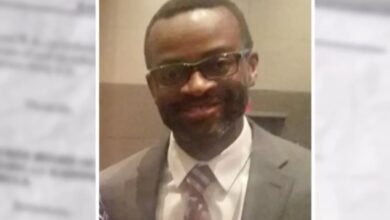Mass. Inmate on Decade-Long Quest for Sex Change
By DENISE LAVOIE
AP Legal Affairs Writer
BOSTON – Every day, when Michelle Kosilek goes out in the yard at the all-male Norfolk state prison, she hears the nasty remarks yelled by fellow inmates: “Freak!” “Faggot!” “Act like a man!”
She’s gotten used to the insults, but says she’ll never be able to accept life as a man.
Kosilek, who was born male and named Robert, was convicted of murdering his wife in 1990 and sentenced to life in prison. In 1993, Kosilek legally became Michelle and now identifies as a woman.
Her quest to force prison officials to provide a sex-change operation has stretched more than a decade. If she wins her federal lawsuit, Kosilek would become the first inmate in the country to receive a taxpayer-funded sex-change operation. But the surgery is far from a sure thing.
A federal judge has been hearing evidence from an array of medical experts, corrections officials and others over the course of the last five years but has yet to issue his ruling.
Kosilek’s request has become fodder for radio talk shows and politicians who say the state should not be forced to pay for a convicted murderer’s sex-change operation, especially since many insurance companies reject such procedures as elective. A bill that would ban the use of public money for sex-change operations, hormones and other treatments is pending in the state Legislature.
Kosilek is hoping a recent decision by a federal appeals court could bolster her case.
In that ruling, the 1st U.S. Circuit Court of Appeals in Boston found that Massachusetts corrections officials’ refusal to provide female hormone therapy to another inmate constitutes “deliberate indifference” to a serious medical condition and violates the inmate’s constitutional rights. The ruling said prison officials can no longer use security concerns as a reason for denying the treatments. Prison officials also have cited security risks in Kosilek’s case, saying that allowing her to have the surgery would make her a target for sexual assaults by other inmates.
Kosilek calls the DOC’s security argument a “pretext” to allow prison officials to avoid giving her what she says is medically necessary surgery. She says she suffers from gender identity disorder, which in her case leads to depression, anxiety and feelings of hopelessness.
“Everybody has the right to have their health care needs met, whether they are in prison or out on the street, and people in prison who develop bad hips or bad knees or bad hearts have surgery to repair those things,” Kosilek told The Associated Press during a recent telephone interview from prison.
“The problem with (gender identity disorder) is that for some reason, somewhere along the lines, transsexuals developed in the minds of a certain portion of the public a freak status that makes it a little scary to them,” she said. “People are scared of things that they don’t understand. It’s a very complex medical issue.”
The Department of Correction argues that Kosilek is highly functional and does not have a serious medical need that requires surgery. They say Kosilek has done well under a treatment plan that has included female hormone treatments and psychotherapy.
Kosilek, now 62, said she has felt trapped in the wrong body since childhood.
“I know I don’t belong in this flesh. It’s a mistake and it needs to be corrected,” she said. “I’m very sad much of the time. I do a whole lot of crying.”
Born in Chicago, Kosilek said she remembers her mother yelling at her for dressing in her sister’s clothing.
“I told my mother I was a girl and she said, `No, you’re not, you’re a boy and boys don’t wear their sister’s clothes or play with dollies,”‘ Kosilek said.
Kosilek said her grandfather began molesting her when she was 10. By the age of 12 or 13, the boy who dressed like a girl started having sex for money.
After being in and out of jail, Kosilek ended up in Boston in 1983 and later went to a substance-abuse treatment center in Fall River, where he met a counselor named Cheryl. They later married.
“She convinced me that what I really need to get rid of my gender identity issues was the right woman,” Kosilek said.
Kosilek said the couple had a “relatively happy existence” for six years.
Then on May 20, 1990, they had a violent argument that ended with Cheryl dead.
Kosilek said Cheryl threw a mug of boiling water at him. Kosilek remembers slapping Cheryl across the face, then saw Cheryl reach into a drawer and pull out a knife. Kosilek recalls knocking the knife out of Cheryl’s hand, but doesn’t remember anything else.
Cheryl died of strangulation. Kosilek was arrested in New Rochelle, N.Y., four days later after being stopped for speeding.
Kosilek insists it was self-defense.
Within months of being arrested, Kosilek asked prison officials to be seen by a gender specialist and to start taking female hormones. They repeatedly denied the request.
In 2002, U.S. District Judge Mark Wolf found that prison officials had failed to adequately treat Kosilek’s gender identity disorder, but stopped short of ordering sex-reassignment surgery. Kosilek sued again in 2005, saying that the hormone treatments, hair removal and psychotherapy she had received since the 2002 ruling were not enough to relieve her anxiety and depression.
Wolf began hearing testimony in 2006 and has reopened the case several times. The judge has not indicated when he will issue his ruling.
Several experts who testified for Kosilek, as well as several doctors retained by the Correction Department’s health care provider, said they believe the surgery is medically necessary for Kosilek, who has twice tried to commit suicide in prison. But two experts hired by prison officials said Kosilek does not need the surgery.
Courts in several other states have ordered prison officials to provide hormone treatments, psychotherapy and hair removal, but no inmate in the country has ever succeeded in getting a court to order a sex-change operation.
In Massachusetts state prisons, 16 inmates are receiving some sort of treatment for gender identity disorder. Prison officials declined to comment on the Kosilek case, citing a policy against commenting on pending litigation.
Jennifer Levi, director of the Gay & Lesbian Advocates & Defenders’ transgender rights project, said corrections officials in many states generally do not grant requests for hormone therapy and other treatments until they are ordered to do so by a court.
“One of the issues, for sure, is just the misunderstanding about the underlying condition and people’s perception that surgery for sex reassignment is not essential medical care,” Levi said.
While Kosilek waits for Wolf’s ruling, she lives in the general population of the all-male, medium-security prison in Norfolk. She exercises in her cell, does her job as a prison janitor and ventures outside once a day to power walk. In addition to a steady barrage of disparaging remarks from other inmates, Kosilek said she’s also forced to tolerate guards who insist on calling her “he” instead of “she.”
“The real frustration is knowing that there’s something that can be done to stop my suffering,” she said. “To deny this treatment to me based on political expediency just adds to my frustration.”











Comments